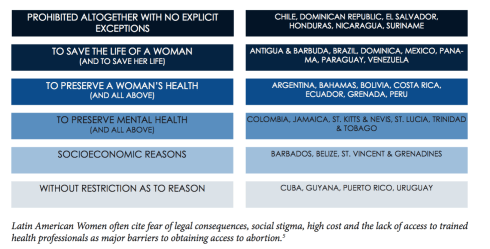by Andrés Carranza Betancourt
El Salvador’s Constitution recognizes a legal person since the moment of conception. It is one of six nations where abortion is illegal under all circumstances. The country’s penal code contains nine articles outlining the possible consequences of abortion and its population is deeply religious. Welcome to a country where an issue of such relevance can merely become a political strategy.
On Oct.11, Congresswoman Lorena Peña, of the ruling left-wing Frente Farabundo Martí para la Liberación Nacional (FMLN) party, proposed a reform to the country’s penal code that would decriminalize abortion in cases of sexual abuse and when the life and health of the mother is at risk. Her proposal is perhaps the most relevant news regarding such issue in the country since its highest court denied Beatriz – a 22-year-old woman with a high-risk pregnancy – an appeal to undergo an abortion.
Unfortunately for Peña, she is fighting a losing battle. To reform the penal code, the ruling party needs 43 out of 84 votes in congress. They currently hold 31 seats. The conservative, predominantly anti-abortion, Alianza Republicana Nacionalista (ARENA) party holds 35. The decisive votes are on the hands of the Gran Alianza para la Unidad Nacional (GANA), a right-wing party with similar conservative and religious stances to those of ARENA.
Peña’s reform will face strong public opposition from pro-life organizations and the Church.
They both proved themselves influential in Beatriz’s case and lobbied fiercely against abortion. Moreover, Peña faces a strong legal precedent and her reform could be deemed unconstitutional. The proposal came a day after President Sanchez Cerén announced that the country was experiencing a state of “emergency” due to a severe fiscal crisis. The latter has dominated the political narrative for months. Cerén’s government lacks financial liquidity and faces risk of default. Additionally, the ruling party reformed the country’s current pension law, allowing the government to use the money from workers’ individual pension savings accounts to finance its debt. The reform generated a strong backlash from civil organizations, trade unions, and the opposition. The latter has even been labelled “unconstitutional” by some scholars.
To continue to function, the government needs Congress’ approval for the issuing of $1.2 billion worth of government bonds. ARENA, whose votes are needed for such approval, refuses to do so unless the government halts the “confiscation” of workers’ savings and adopts austerity measures.
Such conditions have resulted in a heated and polarizing debate, in which FMLN has adopted an aggressive, non-compromising stance.
Given that the ruling party is currently under great popular pressure for its inability to solve the fiscal crisis, FMLN needed something that would remove such inability from the national spotlight. Peña’s announcement served as the perfect engineered smokescreen to the issues affecting her party’s image and approval. The national narrative was shifted and many would hope that Peña’s move will spark debate amongst political actors. However given FMLN’s recent combative attitude whilst discussing the fiscal crisis, it is unlikely that a consensus on abortion will be reached, if no accord regarding the current financial situation has been agreed. The latter is a priority for ARENA. Consequently, it is likely that Peña’s reform will make some noise and successfully divert the national conversation for a while, but when it comes to actual change and reform, Peña’s request comes at bad timing. Said timing, in addition to the many roadblocks Peña’s path, shows how her move is destined to fail.

Why didn’t she attempt this when her party had 35 out 84 seats in congress back in 2009? Alternatively, why didn’t she push for reform when Beatriz’s case was the focus of national and international debate and when organizations – ranging from the United Nations to the Inter-American Commission on Human Rights – had a strong presence in the country? In both scenarios Peña would have had greater chance to leverage her political capital.
Peña’s reform also aims to divide ARENA which has a growing liberal faction. Young Congressman John Wright for instance has shown progressive views on gay marriage and abortion, claiming that abortion should not be a “black or white matter”, but an open discussion. In response to recent news, he asked for the issue to be debated without extremism. Nonetheless, senior members have shown their utter rejection to reform. Congresswoman Ana Vilma de Escobar commented on social media that she “will never support the mass execution of human beings”. Clearly, the matter can produce cracks within FMLN’s main opposition. This is beneficial particularly because ARENA has remained united and fully focused in fighting the government’s irresponsible spending.
A divided ARENA nonetheless, eases the pressure on the official party as it diverts the conservative party’s focus to internal issues.
This can give FMLN more leverage in their negotiations with ARENA, as dealing with internal issues consumes political capital in the form of time and public approval.In a country where abortion is a touchy issue, Peña’s approach will not succeed. Her timing was beneficial to her party’s interests and not to the interests of those individuals she supposedly wishes to help. Abortion has been once again used as a political tool and not as a social issue concerning the lives of women, children and the unborn.
Andrés Carranza Betancourt is a passionate learner in an exuberant world. He was born and raised in El Salvador and attends Bates College where he Double Majors in Politics and Economics and is part of the institution’s debate team. He has written various political articles in his home country for nationally acclaimed newspapers and is an avid football fan (and refuses to call the sport soccer). Andrés enjoys a good time with family and friends and is committed to his country’s progress.
The views expressed in this article are those of the writer. The Contemporary takes no position on matters of policy or opinion.
The featured image was created by Andy Acevedo.

